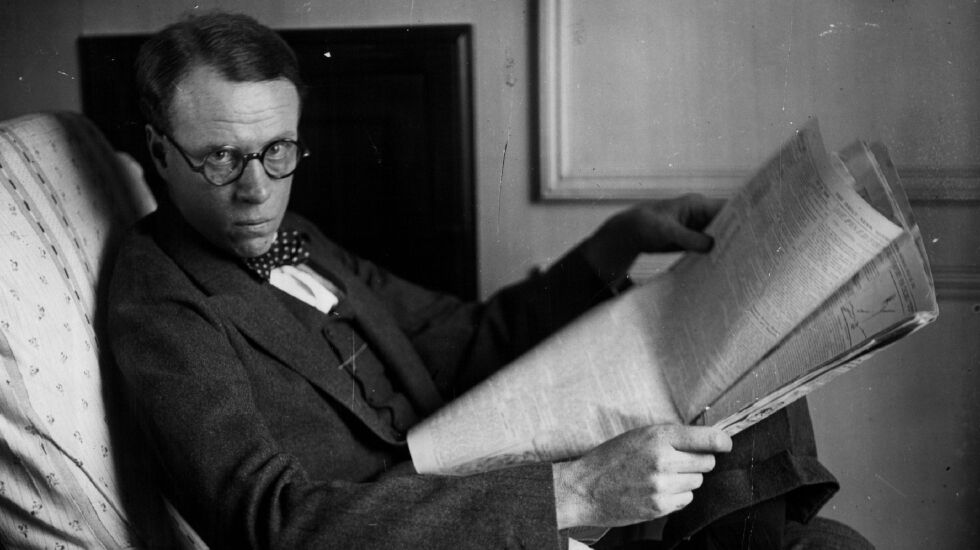
In professional journalism, the story you set out to tell sometimes is not the story you end up writing. You pull a thread thinking it will take you here, and it ends there instead.
For instance: This week is the 100th anniversary of the publication of “Babbitt,” by Sinclair Lewis, and, in that direct, plodding, linear way of mine, I thought that called for a column about the 1922 novel.
My education being as flawed as the next guy’s, I had never read “Babbitt” or anything else written by Lewis, my sole interaction with the first American winner of the Nobel Prize in literature being a lifelong struggle not to confuse him with Upton Sinclair, author of “The Jungle,” which I did read.
I did know that “babbitt,” lowercase b, has entered the language describing, as Webster’s puts it, “a business or professional man who conforms unthinkingly to prevailing middle-class standards.” Which was criticism in 1922 but a century later, with society fracturing and half the individuals pursuing some insane conspiracy theory or cracked cult, now seems like a lost Eden. At least Babbitt cared what others thought.
The novel isn’t bad. George Babbitt is an unscrupulous real estate agent with desperate yearnings for social approval. We meet his dull wife, restless daughters and mechanically inclined son. I would recommend it wholeheartedly but, alas, jumped the gun and finished it months ago.
Giving myself time to proceed to “Main Street,” Lewis’ 1920 bestseller, a superior book, given the strength of its main character, Carol Kennicott, married to a doctor in the small town of Gopher Prairie, which she becomes increasingly desperate to escape. Kennicott is to Babbitt as a CGI dinosaur is to a wooden marionette.
“Main Street” having been read, cover to cover (I do tend to plan ahead), I went on to “It Can’t Happen Here,” Lewis’ cautionary tale of America under fascism. Written in two months in the spring of 1935, the book received renewed attention in 2016 with the election of a certain certified liar, bully and fraud. Or as The New York Times put it in a headline, “Reading the Classic Novel that Predicted Trump.”
OMG. While of course Berzelius Windrip, the self-satisfied numskull who manages to defeat President Franklin D. Roosevelt in 1936 in Lewis’ novel is not an exact foreshadowing of Donald Trump — who could predict that? — the parallels are astounding.
Both leaders demand “louder, more convincing Yeses from everybody.” Both are opposed by wavering liberals like Doremus Jessup, the small-town Vermont editor who thinks his editorials will keep Windrip from power and his own status in the town will save him from a concentration camp. Neither proves true.
“It Can’t Happen Here” makes Philip Roth’s terrifying “The Plot Against America” feel as benign as “Pat the Bunny.”
There is one big difference between Windripism and the Trump cult, and that might be the most frightening aspect of all. Windrip’s cynically labeled “marching clubs,” the Minute Men, are actually an ad hoc Gestapo of armed thugs used to crush any kind of opposition.
This was where Trump erred — he didn’t mobilize and unleash his followers in an attempt to violently overthrow the laws of our nation until the very end, Jan. 6, when it was too late and didn’t work, barely. Given a second chance, he won’t make that mistake again.
When Trump was first elected, the horrors in the book, the street killings and disbanding of Congress, struck critics as too extreme to be relatable. Now, not quite as much.
“It Can’t Happen Here” also underestimates the pugnaciousness of American states. Actual patriotic Americans won’t just roll over or flee to Canada. As seen in Illinois, girding itself as an oasis of Blue liberty in the Red desert of fundamentalism, I don’t think the states would allow themselves to be dissolved and bunched into more easily managed regions as they are in “It Can’t Happen Here.”
America has always been a lucky country. Fortunate in her resources, in our protective oceans. Lucky that a Hitler wasn’t running here in 1932 and that a real-life Buzz Windrip didn’t show up in the flesh until 2016. Whether that luck will hold is an open question.
I’m a little reluctant to recommend you prepare with “It Can’t Happen Here,” because it will disturb you. Unless, of course, you belong to that one-third to one-half of Americans who don’t seem bothered by anything.







